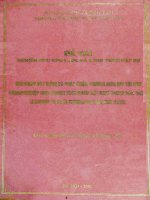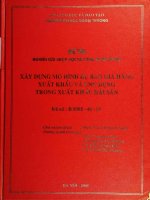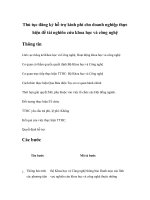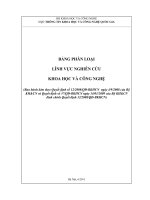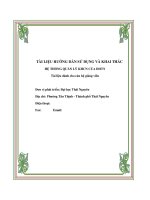Nghiên cứu động học và công nghệ của laser rắn Cr3+-LiSAF được bơm bằng laser bán dẫn
Bạn đang xem bản rút gọn của tài liệu. Xem và tải ngay bản đầy đủ của tài liệu tại đây (370.6 KB, 2 trang )
TRANG THÔNG TIN VỀ NHỮNG ĐÓNG GÓP MỚI
VỀ MẶT HỌC THUẬT, LÝ LUẬN CỦA LUẬN ÁN
Tên luận án: Nghiên cứu động học và công nghệ của laser rắn Cr
3+
:LiSAF được bơm
bằng laser bán dẫn
Chuyên ngành: Quang học Mã số: 62 44 01 09
Nghiên cứu sinh: Nguyễn Văn Hảo
Người hướng dẫn: 1. GS. TS. Nguyễn Đại Hưng 2. PGS.TS. Nguyễn Thế Bình
Cơ sở đào tạo: Viện Vật lý, Viện Hàn lâm Khoa học và Công nghệ Việt Nam
Những đóng góp mới của luận án
Luận án đã góp phần phát triển nghiên cứu động học và công nghệ của laser rắn
Cr:LiSAF được bơm bằng laser diode. Những kết quả nghiên cứu mới của luận án có thể tóm
tắt như sau:
1. Việc nghiên cứu động học trong quá trình phát xạ laser Cr:LiSAF băng rộng và
băng hẹp dựa trên hệ phương trình tốc độ mở rộng cho các bước sóng laser đã cho phép quan
sát tường minh được một tiến trình phổ - thời gian trong phát xạ laser của một môi trường
laser có phổ khuếch đại băng rộng, được coi là mở rộng đồng nhất như môi trường laser
Cr:LiSAF. Động học laser Cr:LiSAF bị ảnh hưởng rất mạnh bởi các thông số bơm và thông
số buồng cộng hưởng.
2. Việc nghiên cứu quá trình quá độ của buồng cộng hưởng laser cho thấy: Khi bơm ở
gần ngưỡng, laser Cr:LiSAF có thể phát các xung đơn, ngắn cỡ vài chục ns, ngắn hơn hàng
nghìn lần so với xung bơm 100 µs. Điều này đã được chứng minh bằng thực nghiệm trong
các môi trường laser rắn khác như Nd:YVO
4
3. Xây dựng hệ phương trình tốc độ đa bước sóng cho laser Cr:LiSAF Q-switching
thụ động bằng chất hấp thụ bão hòa Cr:YSO có phổ hấp thụ băng rộng. Qua đó, chúng tôi đã
nghiên cứu lần đầu tiên động học của laser rắn Cr:LiSAF Q-switching thụ động bằng chất
hấp thụ bão hòa Cr:YSO, được bơm liên tục bằng laser diode trong cả hai chế độ hoạt động
laser băng rộng và băng hẹp điều chỉnh bước sóng. Các đặc trưng hoạt động của laser này
không chỉ phụ thuộc vào các tham số bơm, buồng cộng hưởng và tham số chất hấp thụ bão
hòa mà còn phụ thuộc mạnh vào bước sóng.
4. Việc nghiên cứu thiết kế các buồng cộng hưởng cho laser Cr:LiSAF hoạt động ở
hai chế độ liên tục và khóa mode thụ động bằng chất hấp thụ bão hòa, được bơm bằng laser
diode cho phép chọn được các tham số buồng cộng hưởng tối ưu để phát triển thực nghiệm
hệ laser Cr:LiSAF liên tục và xung ngắn. Các kết quả thực nghiệm phù hợp tốt với các kết
quả tính toán lý thuyết.
THESIS INFORMATION
Title: Research the dynamics and technology of laser diode-pumped solid-state Cr
3+
:LiSAF
lasers
Specialty: Optics Code: 62 44 01 09
Ph.D student: Nguyen Van Hao
Supervisor: 1. Prof. Dr. Nguyen Dai Hung 2. Assoc. Prof. Dr. Nguyen The Binh
Institution: Institute of Physics, Vietnam Academy of Science and Technology
Summary of the new results of the thesis.
The thesis has investigated the dynamics and technology of laser diode-pumped solid-
state Cr:LiSAF lasers. The new obtained results of the thesis can be summarized as follows:
The dynamic processes of diode end-pumped, broad and narrow-band Cr:LiSAF laser
emissions have been investigated using a system of rate equations extended to all
wavelengths. The obtained results allow to observe clearly the spectro - temporal evolutions
in the laser emissions using Cr:LiSAF crystal as an active medium of broad gain spectrum
considered as homogeneous broadening. The dynamic processes of diode end-pumped
Cr:LiSAF lasers were demonstrated to be dependent strongly on pumping and resonator
parameters.
The investigation of dynamic processes of the diode end-pumped solid-state Cr:LiSAF
lasers allow to understand clearly their resonator transients. As a result, a generation of single
and short laser pulses is obtainable from the Cr:LiSAF lasers operated at their near-threshold.
By proper choices of solid-state laser resonator and pumping parameters, duration of single
solid-state laser pulses was computed to be in nanosecond range and therefore, much shorter
than the diode laser pumping pulse (100 µs). Direct generation of single short laser pulse has
been experimentally demonstrated in other solid-state laser mediums such as Nd:YVO
4
The establishment of a rate equation system extended to multi-wavelength for
describing a Cr:LiSAF laser passively Q-switched with Cr:YSO crystal used as a saturable
absorber has been well done. Thereby, we have numerically investigated, for the first time,
the spectro-temporal characteristics of the CW diode-end-pumped, passively Cr:YSO Q-
switched Cr:LiSAF lasers in broadband and narrowband laser operations. The characteristics
of the passively Q-switched Cr:LiSAF lasers were demonstrated to be dependent clearly on
wavelength and resonator parameters.
The design researches of folded four-mirror resonators for diode end-pumped solid-
state Cr:LiSAF lasers (in CW or passively mode-locked ultra-short pulse laser operations)
were carried out in order to choose their optimal resonator parameters. As a result, the diode
end-pumped solid-state Cr:LiSAF lasers were successfully developed as experimental
evaluations, the experimental results are in good agreement with the calculated ones.
